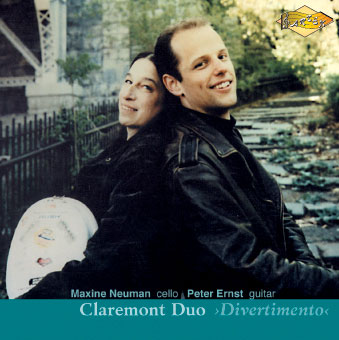ARTEK Recordings
Reviews of CD 15

Click to Order Recording

ARTEK Recordings |

|
![]()
ARTEK RECORDINGS CD15: Clairmont Duo Divertimento
Arkiv Music
Fine engineering here from Bernhard Hanke, solving all the tricky balance issues in the beautiful acoustic of Bad Münder's Kurhaus, which almost becomes a third, discreet player. The full tone of Maxine Neuman's cello dominates when it should, but the subtleties of Peter Ernst's guitar-playing are never lost. Both instruments have their passionate outbursts, and the sound, though close, is unconfined when they let loose.
The Mozart is arranged from a wind-trio original, but suits cello/guitar just as well. In the Larghetto, the contrast between the elegance of Ernst's top-notch guitar figuration and Neuman's emotional scale gives a good indication of the strength of the chamber partnership, because the divergent sounds work perfectly together. The familiar Fauré miniatures are affecting, and Neuman's straight approach to Après un rêve is very different from Tortelier's more inflected account. Kraft was the principal cello in Haydn's orchestra, and his work was actually composed for the cello/guitar combination. I'd commend it to players, especially for the catchy Lento cantabile theme, but the other movements are pretty soulful, too, and Neuman sounds highly involved with Kraft's sympathetic cello line: a worthwhile discovery.
In Piazzolla's Oblivion, Neuman makes palpable the sense of quiet outrage at lost love,
with tears courtesy of Ernst's rapt guitar. The Cohen and Gismonti works give Ernst more
of a chance to shine, and his tonal range is captured with little in the way of fretboard
noise. There are no disappointments, in fact, and I hope the success of this CD gives the
Duo the confidence to make further arrangements from the meaty sonata repertoire. Cohen's
Toccata is a tour de force, technically and musically, from both artists, and this Artek
disc is recommended to players and listeners alike.
- Paul Ingram, FANFARE
Classical CD
"As I grumpily note most times I have occasion to review his music I am no great admirer of Piazzolla. Still, I put away my World Music milch cow objections from time to time, and the Claremont Duo certainly make something evocative and sensual out of Oblivion, a piece I've heard elsewhere living down to its name. The Duo is composed of cello and guitar so we have a pleasant album of arrangements and transcriptions, in the main, and agreeably charming. Kraft was Haydn's principal cello in the Esterhazy orchestra and Haydn wrote his cello concertos for Kraft. As a composer Kraft's geniality is spiced with lyrical ease - that and a songful generosity (one of the phrases in the opening of the Lento cantabile sounds just like a phrase from one of those Haydn Concertos). Neuman doesn't project an unnecessarily big sound here but is judicious in her vibrato and lyric phrasing - as both are in the finale, with its delicious pizzicato episode, where Ernstís role is obviously more constrained."
"The Mozart Divertimento was apparently originally written for two clarinets and bassoon. They play the Menuetto particularly well with fine and delightful rhythm and a sure control of sonority and nuance. Allen Cohen's Duo-Partita was written especially for these performers. It contains within it hints of the baroque and is written in a direct and accessible style, most attractively so in fact. There are elements of Spanishry in the accompanying guitar figures as well as more rugged though still affirmatory writing. The second movement is a Passacaglia and Fugue, conventional enough until it begins to swing along the way and the Romanza, though not unclouded, manages to insinuate itself into the mind. The cello plays in alt and the guitar sings single lines - atmospheric and effective and Cohen manages to differentiate the string registers and sonorities well. The sharply etched finale is also etched with moments of nostalgia but thereís also a driving moto perpetuo element that pulses the music onwards that uses the guitar's percussive potential well, in which each instrument's quiet reveries are mocked by the other. The final furlong is exciting and wilful."
"Well produced the booklet notes are tidy and to the point with nothing effusive
about it. If the purpose of it was to divert by showing contemporary works, such
as the Cohen and Gismontiís swaying Agua e vinho, in their Divertimento context
then I think it succeeds."
-Jonathan Woolf
![]()